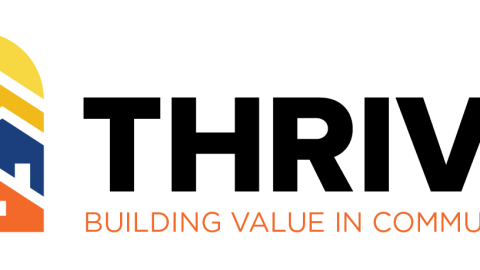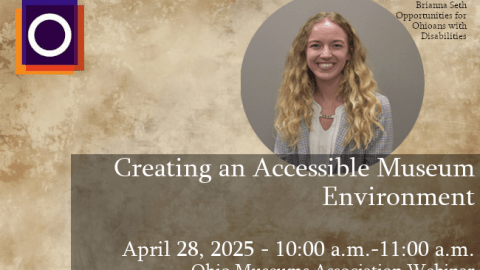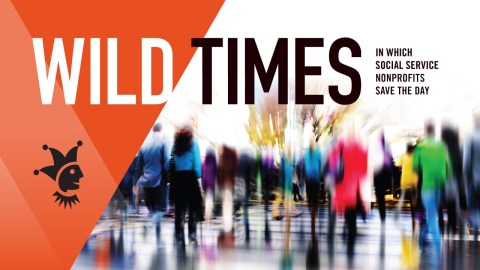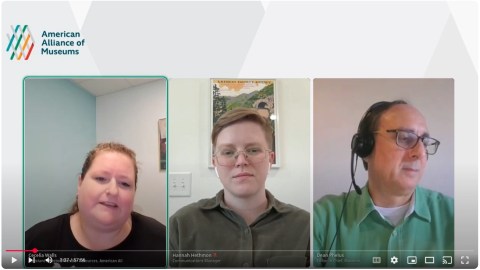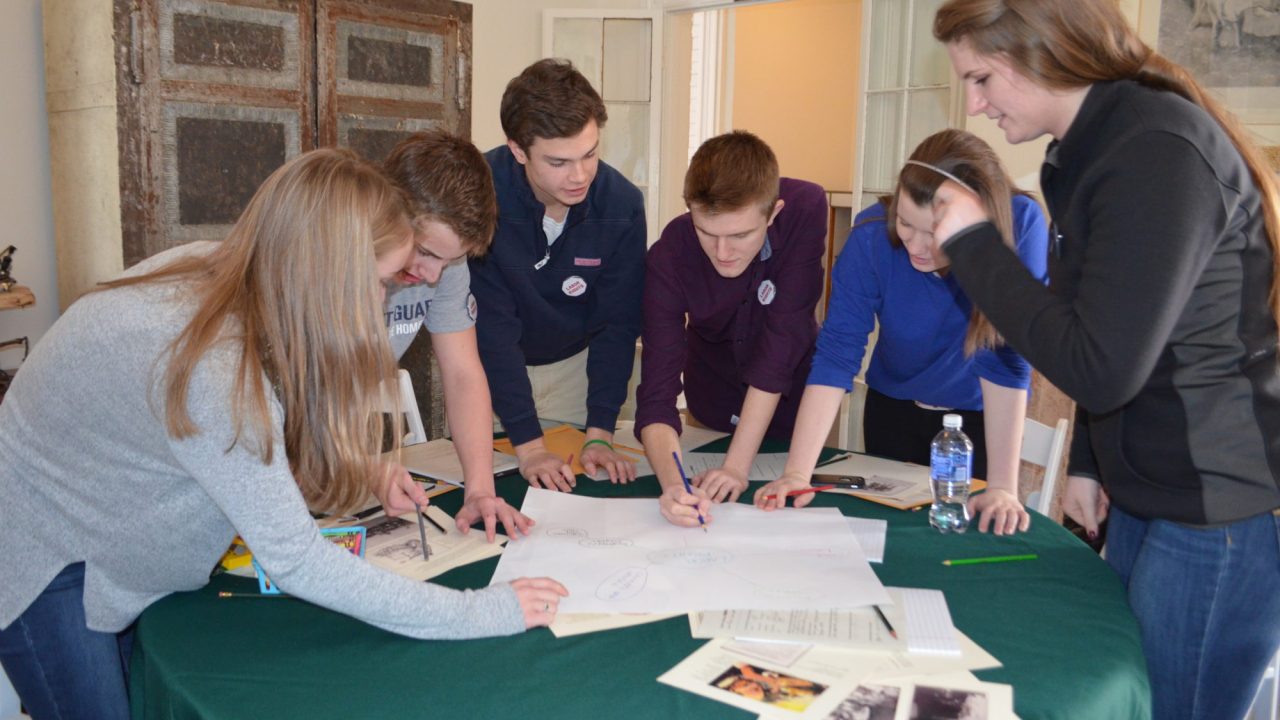
Abby Pfisterer is the Director of Education at Morven Park in Leesburg, Virginia. In this role, she leads the development of K-12 school programs that teach students the skills, knowledge, and mindset they need to be leaders and change makers – continuing the legacy of leadership left behind by the historic owners of Morven Park.

In 2010 Morven Park, a historic site in Loudoun County, Virginia, set out to answer the big museum question: How can we make our site and history relevant to our community?
Morven Park is a 1,000-acre site with a two hundred year history that spans from the early republic to the first half of the 20th century. It has a sprawling Greek Revival mansion that was home to several families and is filled with art and artifacts from around the world. Today, Morven Park is open to the public thanks to the last owner, Marguerite Davis, who established the museum and supporting foundation in memory of her husband. Since opening to the public in 1967, tours of the mansion focused on the unique collection, gathered by the Davises, and the biography of her husband, Westmoreland Davis who served as Governor of Virginia from 1918-1922.
Since that time the mansion and site saw moderate attendance, but it primarily consisted of visitors from outside the area. It seemed that our local community either did not know that the site existed or that it held anything of meaning for them. This was reinforced by our repeated wins of the local “hidden gem” award. But, who wants to be hidden?
The first step towards engaging our community was to review our assets and determine our story. After a long (and sometimes torturous) reflection on the history of the site and the people who lived here, we realized that throughout its history, Morven Park had been home to civic activists, community leaders, and public officials. Morven Park’s legacy is one of civic engagement throughout the centuries, and this history provides us with an incredible source of inspiration for engaged citizenship today.
Excited by a focus on civic engagement and education, we looked to define our community and its needs. Loudoun County is one of the fastest growing counties in the country, boasting a population of over 350,000 with 60% of the households in the county containing school-age children, a percentage that continues to grow as families relocate to the area. With this information in hand and our new focus on civic engagement, we reached out to the local school district to learn more about their goals for students and how we could work together as partners.
During these discussions, we learned that the school system shared our interest in teaching real and meaningful civics and were excited by what we, as a historic house museum, could bring to the table. These conversations lead to an early draft of Morven Park’s K-12 civic education curriculum. Drawing from our history, we developed a series of programs that teach students essential skills of engaged citizenship and provide them with opportunities to apply them in real-world settings.
This process, of identifying our civic legacy and establishing an enthusiastic partner in the local school district, resulted in the formation of Morven Park’s Center for Civic Impact. Based on the core belief that all students can have a positive impact on their community, Morven Park’s Center for Civic Impact develops and leads programs for K-12 students focused on teaching four key characteristics of engaged citizenship:
- Know your voice matters
- Critically examine challenging issues
- Take responsibility for our shared future
- Make an impact
Our programs are issue-based, interactive, and authentic. We utilize the resources of Morven Park – the stories, objects, and location – to provide inspiration and context for the programs. For example, we draw upon historical issues of the past and step back into that time frame to consider what we would have done. We gather around an object and use it to foster a dialogue about tolerance and our actions towards each other. We examine the natural and built environments to assess the choices made and consequences they created.
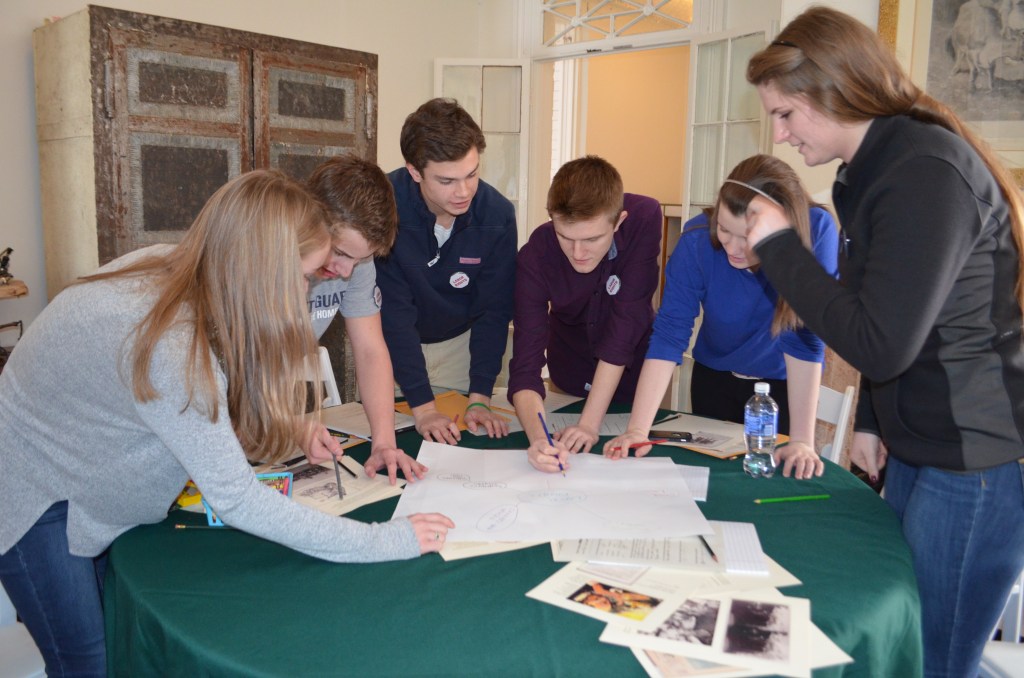
Taking this approach has opened up new content doors for us. We’ve found that the skills of engaged citizenship – critical analysis, creating problem solving and articulate communication – can be taught in any subject area. We teach civics through many content lenses, including history, art, science, math, and government. Let me share a few program examples to illustrate this:
- The Advocacy Game: Our flagship high school program! Tied to US History curriculum and the history of Morven Park, this program channels the activist spirit of the Progressive Era to teach students that they have the ability to affect change. Through a historical simulation, students work in teams to deliberate issues from the period, build solutions and then advocate for their ideas through soap box speeches, protest songs or marches. Check out this blog post to read more about The Advocacy Game.
- Stars & Stripes: Our newest offering, this program transports middle school students back in time to the cusp of the United States’ entry into World War One. They analyze visual media, including propaganda from our collection, and must decide how they feel about this important decision, but they may only communicate using imagery. This program focuses on helping students learn to find their voice and share it in a visual manner. Learn more about this program here.
- Meadows, Milkweed & Monarchs – Oh My!: In this environmental science based program, elementary school students morph into monarch butterflies to learn about this creature, the role it plays in the environment and the current threats to its existence. Students are then challenged to create an awareness campaign and help the monarch by planting monarch-friendly gardens at their schools. More information about this program can be found here.
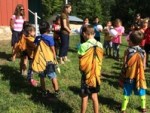
For teachers, these programs fit with their curriculum and challenge their students to think in ways they might not have before. During each program we see the students rise to the program’s challenges while sharing their ideas and collaborating with their teammates. Our goal is to bring awareness to the students that their voices matter and to help them develop the abilities they need to affect meaningful change in their worlds.
In 2012 we piloted our first civics-based programs with 250 students. Since that time, we have reached over 10,000 local students and see exponential growth with each new academic year. Our popularity with teachers and students alike tells us that we’re on to something – that by rethinking how we teach at a historic site, we can have a real and tangible impact. Morven Park, once a traditional historic house museum, is now a catalyst for inspiring young people to be active community members and engaged citizens. Morven Park is no longer a hidden gem and is instead directly engaging and serving our community. With the site’s history serving as a strong foundation for the civics programs, we have our eyes on the future and can’t wait to see how these incredible students will shape it.
About the Author
Abby has worked in the education field for the past ten years with museums and public schools. She has a BA degree from Colorado State University in History Education and Political Science, and an MA from the University of Massachusetts in Business Administration. She holds a professional educator’s license for secondary Social Studies education.
